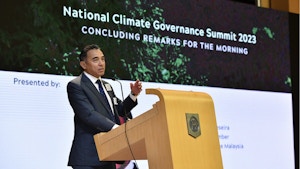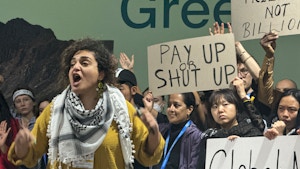With COP29 only less than a month away, expectations from the world’s biggest climate conference have been dominating conversations among nonprofits, academics and other climate watchers at events I have been attending.
To continue reading, subscribe to Eco‑Business.
There's something for everyone. We offer a range of subscription plans.
- Access our stories and receive our Insights Weekly newsletter with the free EB Member plan.
- Unlock unlimited access to our content and archive with EB Circle.
- Publish your content with EB Premium.
The big question is whether countries can agree on an amount for the new collective quantified goal (NCQG), and how the Philippines will steer the conversation around the loss and damage fund board as its host at the climate talks. The NCQG is expected to displace the current US$100 billion pledge made by wealthy countries, which is due to expire in 2025.
There is also scepticism over how another petrostate like Azerbaijan can successfully unite the world to tackle climate change.
There were similar concerns over Egypt and the United Arab Emirates (UAE) hosting previous talks. But the uncertainty runs deeper for Azerbaijan.
Apart from hosting Formula 1 motor racing events, the former Soviet republic is known to the world as a major oil and gas supplier. Fossil fuels make up about 90 per cent of its export revenues, and the government is openly working to increase gas production.
“
We cannot blame naysayers for underestimating the upcoming talks, but should be mindful that similar things were said about Egypt’s COP27. But as it turns out, it was in COP27 where the loss and damage fund was finally agreed upon.
The authoritarian state is notorious for curtailing media and civic freedoms, with at least 25 instances of the arrest or sentencing of journalists and activists in the past year, almost all of whom remain in custody.
It does not have a long track record of diplomacy at the United Nations, which is needed to influence the international community towards climate action.
It was chosen last minute in December amid geopolitical tensions, which means it was not present at the Troika meetings, composed of the outgoing host, incoming host for the following year, and the host for 2026. These meetings allow the presidency enough time to work with parties in agreeing on negotiation outcomes.
Some climate summit watchers are dismissing COP29 as a “consolidation COP” where it will merely process the decisions made in previous rounds of negotiations.
Some are proposing that this COP should be bypassed, and the focus should be on COP30, which will be held in Brazil.
After all, Brazil seems to be a more fitting climate leader, as it is home to more than half of the world’s Amazon rainforest and has been active in international negotiations. The Earth Summit, which was held in Rio de Janeiro in 1992, gave rise to the United Nations Framework Convention on Climate Change (UNFCCC), resulting in the Paris Climate Agreement in 2015.
The Latin American country has a long history of strong social and environmental movements, even successfully holding its former president accountable for criminal acts.
This is in stark contrast to Azerbaijan whose president, Ilham Aliyev, has not faced any serious political opposition since he assumed power in 2003, after his leadership was handed over by his father who ruled for three decades.
Azerbaijan has also just emerged from a war with neighbouring Armenia over the disputed Nagorno-Karabakh region, which ended with 100,000 people being displaced from their homes and the government accused of seizing political prisoners who are in captivity to this day.
We cannot blame naysayers for underestimating the upcoming talks, but should be mindful that similar things were said about Egypt’s COP27.
The north African country was the host after COP26 in Glasgow, which was tipped to be where breakthrough climate deals were made. COP26 was the first in-person climate summit after the pandemic, and was infused with optimism. But like so many COPs, little came out of it in the end.
COP27, led by an unlikely host, was also thought of as a “consolidation COP”.
Like Azerbaijan, Egypt was emerging from a turbulent period in its history after the Arab Spring in the early 2010s until the present day where authoritarian rule is said to be responsible for perpetuating the country’s poor human rights record.
But as it turns out, it was the climate conference in the Egyptian resort town of Sharm el Shiek where the loss and damage fund was finally agreed upon, 30 years after Vanuatu first raised the question of who should pay for climate catastrophe.
This was followed by the fund’s operationalisation at COP28 in the UAE.
The same breakthroughs can happen in Azerbaijan.
The implementation of Article 6, a section in the Paris Agreement which lays out the rules for countries to trade carbon credits to meet their national climate targets, is seeing key developments less than a month away from the conference.
For the first time and under immense presure, the supervisory body responsible for creating the UN carbon market under the Paris Agreement adopted standards that allow countries to trade reductions in carbon emissions as well as requirements for projects that remove greenhouse gases from the atmosphere. Such benchmarks needed direct approval from COP in the past, but in a controversial move, technical experts finalised the standards under their own supervision in Azerbaijan in October.
The long overdue standards agreed upon are seen as essential to making Article 6 fully operational.
As we watch out for that in the November conference, the COP29 presidency can still do so much more to hike up ambition and prove those said it would a “non-COP” wrong.
Mukhtar Babayev, COP29 president and an oil industry veteran, detailed in one of his letters how he would prioritise a voluntary fund that should see fossil fuel producers contributing to it.
Energy storage and grids, as well as methane reduction were among the priority items he listed in the action agenda. However, mention of the gradual end of fossil fuel use in energy systems – part of an agreement to last year’s landmark pact in Dubai – was conspicuously missing.
Babayev has shown good faith in other issues. He ensured the appointment of Amercan Senegalese finance specialist Ibrahima Cheikh Diong as the loss and damage fund’s executive director at the board’s last meeting in Baku. This appointment could mean that the pledges made at COP28 will translate into the first tranche of financial aid to be disbursed in 2025, which will brush aside fears that the loss and damage fund is at risk.
He organised a pre-COP29 media trip in April to give journalists a sneak peek at the venue and general landscape of the conference to show that they are not as media-averse as their human rights records suggest they are. He even added some women and young people to his organisational committee in the spirit of inclusion, he said, after the backlash he received for the original all-male membership.
As the climate conference nears, the world will be watching as he attempts to show the door to fossil fuels, and convince everyone why COP29 should not be ignored.















